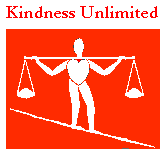
Kindness Unlimited
|
Other pages: Simple Ideas you can implement easily |
|
It
is doing something good for others without expecting any reward or
payoff. It is also called altruism. Why
are we kind? It
is in our genes. Our fitness for survival increased when we
learnt to cooperate (work for others as well as selves). Our entire
civilization and society work on mutual cooperation, they could
collapse if this diminishes below a limit. Is
everyone kind? Yes,
it will be difficult to find someone who never does anything good for
others. This is not to deny that sometimes we do exhibit inconsiderate
or even cruel behaviour.. Almost all of us are sometimes kind and
sometimes inconsiderate. There are no pure blacks or pure whites in the
matter of kindness, we all are shades of gray. We may judge someone as
kind or otherwise because we have had no opportunity to see the other
side of that personality. Can
we increase kindness in society? Most
certainly, if we begin with ourselves! Our behaviour is always
influenced by habits. We think and behave as we are habituated to.
Self-interest is built into our genes to ensure survival, ( remember How
will increasing kindness help? An
act of kindness is likely to be repeated by the receiver soon in some
form, and there is generally a ripple effect that follows.
When kindness in a community increases, cooperation increases and
conflict decreases. Mutual trust increases, and "social
capital" is
created. The community can work more purposefully for common good so
that everyone will be better off. One can easily understand and
appreciate this point if one imagines being stranded on a lonely island
with no other human being. A person in this predicament will miss all
the cooperation and kindness from others which perhaps she used to take
for granted. She may not survive alone for long. Updated onSeptember 14, 2010 |
Kindness Unlimited
Email: kindness.unlimited@gmail.com